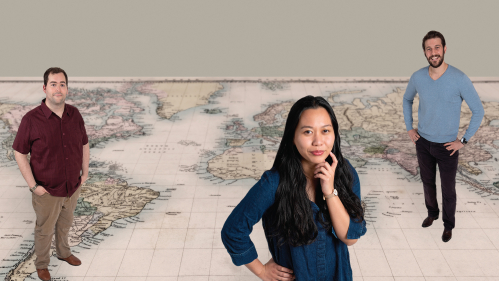Globe Trotters

Rutgers is among the national leaders in producing Fulbright Students, who teach or conduct research abroad. With travel restrictions easing, they will get their chance.
One experience that many people are looking forward to when the global pandemic finally ends is the chance to indulge some wanderlust. For a highly select group of students at Rutgers University–New Brunswick, a return to normalcy will include a rare opportunity to travel abroad as Fulbright Students: living in another nation to immerse themselves in a new culture while continuing their studies or teaching. With each passing year, more Rutgers students have attained the prestigious scholarship, with undergraduates applying through the Office of Distinguished Fellowships and graduate students applying through the School of Graduate Studies. This year, 11 undergraduate and four graduate students were chosen by the Fulbright U.S. Student Program, which is celebrating its 75th anniversary. It is the 12th straight year that the grant program has chosen at least 10 Rutgers students to be one of the roughly 2,000 Fulbright recipients selected annually. This Top Producer designation puts Rutgers in rare company: only 15 other American universities have met the mark.
“The program embraces candidates who possess a wide range of academic interests and professional goals,” says Arthur D. Casciato, the founding director of the Office of Distinguished Fellowships at Rutgers–New Brunswick, which facilitates student applications. “And it is exactly Fulbright’s breadth of vision that allows the high level of achievement that Rutgers has consistently enjoyed over the past 12 years.”
The grants, sponsored by the U.S. Department of State, underwrite the cost of a student’s travel, housing, and living expenses for a year in the nation where they will be teaching or studying. “In graduate education, a Fulbright grant plays a pivotal role in a scholar’s development and can have a transformative impact on the career of a young researcher and scholar; it is foundational support for a graduate student who is establishing their research portfolio,” says Teresa Delcorso-Ellmann, assistant dean of Graduate Student External Support at the School of Graduate Studies, which helps graduate students apply for scholarships, grants, and fellowships.
The Fulbright U.S. Student Program was introduced in a 1945 bill sponsored by Senator J. William Fulbright, who proposed using surplus war property to pay for the “promotion of international good will through the exchange of students in the fields of education, culture, and science.” President Harry S. Truman signed the bill into law in 1946. Today the program offers research, study, and teaching opportunities in more than 140 nations.
“Of all the major national awards, the Fulbright is possibly the most life-changing because it allows students to live abroad for a year and gain invaluable life experience,” says Casciato. “Fulbright recipients get to do something they may never do again in a place they might never have visited.”
Read more about Rutgers' Fulbright Students.